 U.S. Capitol. (Source: Shutterstock)
U.S. Capitol. (Source: Shutterstock)
Members of the House Financial Services Committee passed 14 legislative proposals Wednesday night. Most notably, the Committee passed the credit union trade group-supported "CFPB Transparency and Accountability Reform Act."
The bill's author, Rep. Andy Barr (R-Ky.), introduced the legislation Monday and wants to bring the CFPB under the normal congressional appropriations process that other federal agencies must go through.
Recommended For You
Other items in the bill that would change the CFPB's structure included the following:
- Change the leadership structure from a single director to a "bipartisan, five-member commission."
- Create a dedicated Inspector General for the bureau "to ensure transparency, accountability and to prevent waste, fraud and abuse."
- Create a new Office of Economic Analysis and require cost-benefit analysis for all guidance, orders, rules or regulations of the bureau.
- Require all proposed rules to consider the impact on small businesses.
- Provide awards to whistleblowers who report original information relating to a violation of consumer financial law resulting in certain monetary sanctions exceeding $1 million.
In a statement Thursday morning, CUNA Deputy Chief Advocacy Officer Jason Stverak praised the committee for its work on this issue. "This package contains important provisions to modernize the CFPB while improving accountability and transparency that would benefit consumers and provide stability to the financial services marketplace. We thank the committee for moving it forward and CUNA, Leagues and credit unions will continue to engage members of Congress on this much needed legislation."
NAFCU officials have also shown their support for CFPB reform. In a letter to Committee members ahead of Wednesday's vote, NAFCU SVP of Government Affairs Greg Mesack said. "During consideration of financial reform, NAFCU was concerned about the possibility of overregulation of good actors such as credit unions. Unfortunately, our concerns were proven true. While it is clear the CFPB has done some good, its primary focus should be on regulating the unregulated and the bad actors, not adding new burdens on credit unions that already fall under a prudential regulator.
"The impact of this growing compliance burden from the CFPB is evident as the number of credit unions continues to decline. Since the passage of the Dodd-Frank Act, we have lost over 35% of all credit unions to mergers. The overwhelming majority of these were smaller institutions under $100 million in assets that simply did not have the economies of scale to absorb the rising costs of compliance," Mesack wrote.
While the bill now heads to the full House for consideration, the legality of the CFPB remains in flux as the U.S. Supreme Court announced it will consider a case that might decide if the CFPB's independent status is constitutional.
The Supreme Court expects to hear oral arguments in October, with a ruling possible in the spring of 2024.
In a CU Times interview Tuesday with Mike Calhoun, president of the Center for Responsible Lending based in Durham, N.C., he warned of the ramifications of placing the CFPB under direct congressional appropriations. He said if the Supreme Court ruled as such and strikes down the CFPB's existing funding mechanism, the FDIC and NCUA could be subject to similar fates.
"That is one of the major risks of this court action," Calhoun said. "This would be a radical restructuring of government that would be harmful."
© Touchpoint Markets, All Rights Reserved. Request academic re-use from www.copyright.com. All other uses, submit a request to [email protected]. For more inforrmation visit Asset & Logo Licensing.







